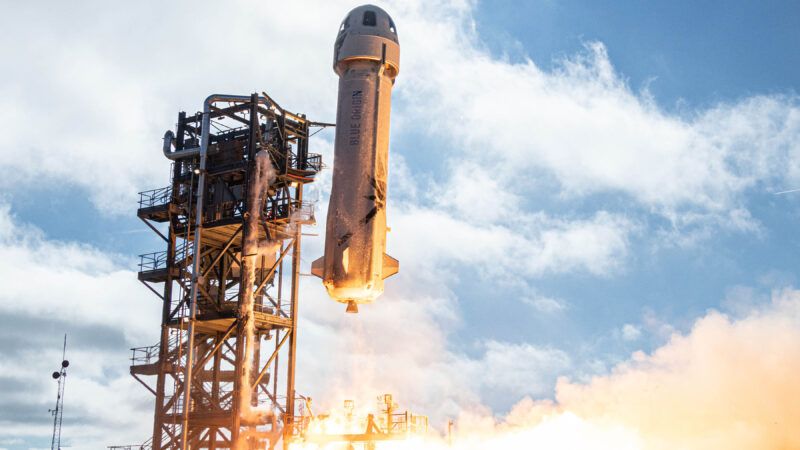Bezos Launching Into Space Will Probably Make Your Life Better Too
May our new space billionaires produce spinoff technologies for the rest of us to enjoy in due time!

Jeff Bezos will launch into space today aboard his Blue Origin rocket, New Shepard. This follows Richard Branson's visit to space last week aboard a Virgin Galactic rocket, a journey that made him the first person to enter space on a vehicle made and funded by his own company. The new space exploration age is here, but most people aren't having it.
"Leave the Billionaires in Space," suggests Jacobin. "Billionaires In Space Are Costing Lives On Earth," says a headline from Boston's public radio station WBUR. The purportedly pro-tech publication The Verge says the nascent industry is "stuck in its billionaire phase."
Well, yeah. Just as dental care, car ownership, and airplane travel were once the sole province of the wealthy, so too is space tourism—for now, but probably not forever.
Our astronauts have completed training and are a go for launch. #NSFirstHumanFlight pic.twitter.com/rzkQgqVaB6
— Blue Origin (@blueorigin) July 19, 2021
Contra popular narratives, the new private space tourism industry is not costing lives here on earth, nor will it be stuck in its billionaire phase for long; the technologies developed by companies like Virgin Galactic, Blue Origin, and Elon Musk's SpaceX will help us all, and in time they may even enable people who are not uber-rich to go to space.
In the 1950s, plane tickets were terribly expensive. A flight from New York to London that would today clock in at about seven hours could take up to 15 hours. Though you didn't have to bother with the Transportation Security Administration's ritual harassment and could get your meal served on china, planes were less safe than they are now—and they were much more likely to be hobbled by delays or cancelations, since weather had a stronger effect on the ability to fly.
Over the decades, flying on airplanes got cheaper, faster, and safer. In the '70s, only a quarter of Americans were flying at least once per year. Now that number has doubled, with almost nine in 10 Americans having taken a commercial flight at least once in their lifetime.
Private spaceflight, which is currently accessible only to those who can fork over a cool $28 million or who were born a billionaire's baby brother, may someday be a feasible vacation option for people who don't have such wealth. But even if it doesn't pan out that way, the technologies created by billionaires' space fantasies will propel many of us, rich and poor alike, to better standards of living in ways we haven't yet fully realized.
As NASA fans constantly tell us, the agency's spinoff technologies have improved the world. Sensors developed to measure and remove harmful moon dust have since been used to better detect air pollution here on Earth; advances in aerodynamics have made semi-trucks faster and more fuel-efficient than before; a more durable polymer material developed by NASA scientists is now used for hip replacements. It's easier than ever to get hot water on demand, to fly airplanes, and to get a life raft that will actually deliver you to safety if you're stranded at sea.
But a scientist need not be a public employee to make discoveries that better mankind. Musk and Bezos are competing to develop a satellite internet service that could drastically improve internet access and speed for unserved parts of the globe. SpaceX has been focused on improving the reusability of rocket components (while spending a fraction of what it would cost NASA to put similar rockets into flight), making space exploration cheaper and less wasteful.
And that's just the beginning. Branson and Bezos have triggered the Twitterati's well-practiced eat-the-rich routine, but their critics are selling short just how much good can be reaped from space spinoff technologies—and just how well-distributed that good may be, even if many of us never see the inside of a Blue Origin spaceship.


Show Comments (61)